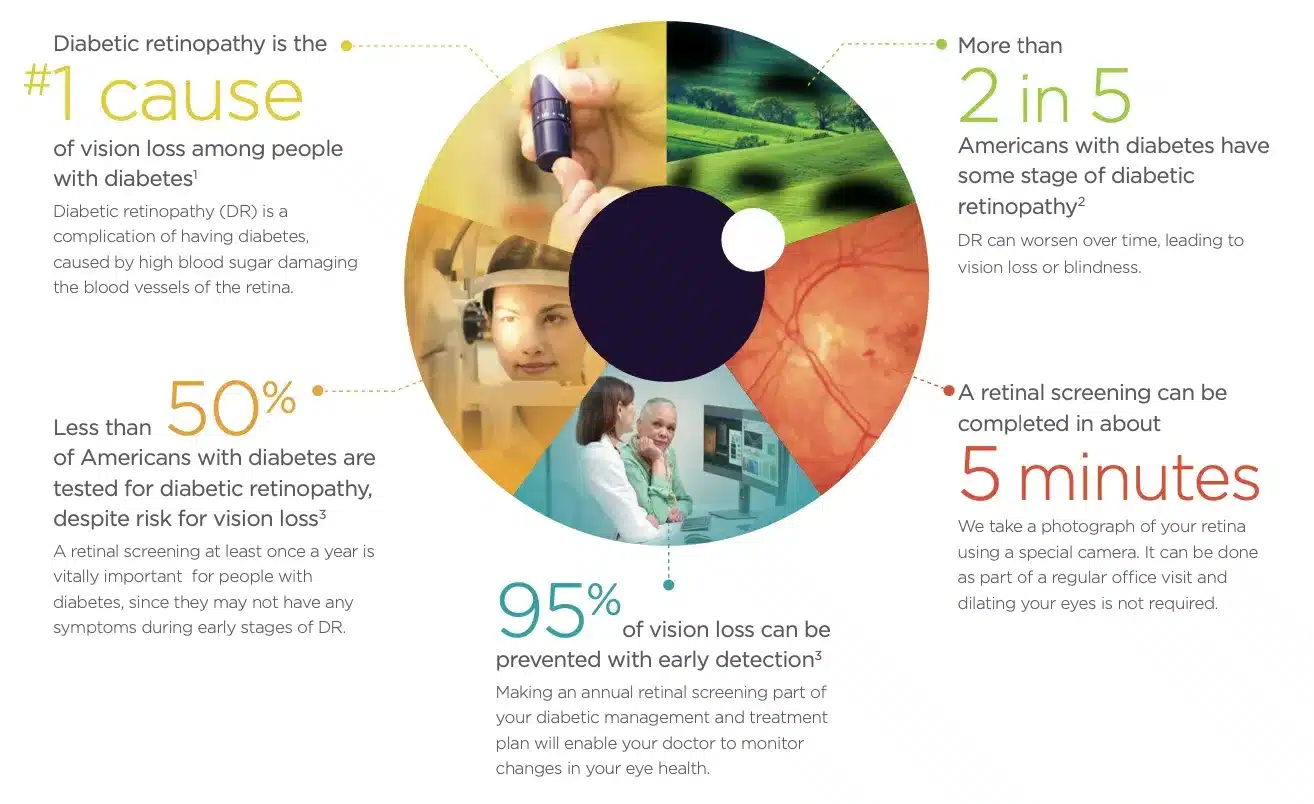What is Diabetic Retinopathy?
Diabetic retinopathy (DR) is a complication of diabetes, caused by high blood sugar damaging the blood vessels of the retina. DR can worsen over time, leading to vision loss or blindness. A retinal screening at least once a year is vitally important for people with diabetes, since they may not have any symptoms during the early stages of DR.
Impact of Diabetes on Vision
Diabetes can significantly affect eye health through a condition known as diabetic retinopathy. This eye disease is the result of damaged blood vessels in the retina caused by high blood sugar levels. Over time, this can lead to blood and other fluids leaking into the eye, causing swelling and vision distortion. In some cases, new abnormal blood vessels may grow on the retina's surface, potentially leading to severe vision problems and even blindness if not managed properly. Regular monitoring of blood sugar levels and maintaining a healthy lifestyle can reduce the risk of developing serious eye complications.
Diagnosing Diabetic Eye Disease
Early diagnosis of diabetic retinopathy is essential for effective management and treatment. Diabetic retinopathy and other serious eye conditions related to diabetes are typically diagnosed through a comprehensive dilated eye exam. During this examination, drops are placed in the eyes to widen the pupils, allowing the doctor to see more of the retina and assess the health of the eyes more effectively. This may be complemented by imaging tests such as fluorescein angiography or optical coherence tomography to evaluate the retina's blood vessels and identify any changes or damage.
Recognizing Symptoms of Diabetic Eye Disease
The early stages of diabetic eye disease may not present any noticeable symptoms. As the disease progresses, patients may notice symptoms such as blurry vision, fluctuating vision, dark or empty areas in your vision, and difficulty perceiving colors. These symptoms can worsen if the condition is left untreated. It is important for individuals with diabetes to have regular eye examinations even if no symptoms are apparent, as early detection plays a critical role in the prevention of vision loss.

Treatment Options for Diabetic Eye Disease
Your treatment options for diabetic eye disease depend on the severity and progression of the condition. In the early stages, managing blood sugar levels, blood pressure, and cholesterol can significantly help in controlling the progression of the disease. For more advanced cases, treatments may include laser surgery, which is used to seal leaking blood vessels or to discourage abnormal blood vessel growth. Injectable medicines can also help decrease swelling. In cases where the retina has started to pull away from the back of the eye, a surgical procedure called vitrectomy might be necessary. Prima Medicine is committed to providing the highest quality care in Merrifield, Fairfax, and South Riding. Our team of experienced doctors is committed to helping patients manage their diabetes effectively and prevent complications associated with diabetic eye disease. Regular check-ups and individualized care plans are part of our commitment to your health and well-being.
Risk Factors for Diabetic Eye Disease
Those with both type 1 and type 2 diabetes may be at risk for developing this eye disease. The risk increases the longer a person has diabetes and with poorly controlled blood sugar. Other factors that can elevate the risk include high blood pressure, pregnancy, high cholesterol, and tobacco use. Regular eye exams are crucial for those at risk to detect and manage diabetic eye disease effectively before it leads to significant vision impairment.
Schedule your retinal screening today!
Ask your doctor at Prima Medicine today about scheduling your retinal screening. It's Convenient and Done at the time of your visit at Prima Medicine.
If you have diabetes you should have a retinal screening at least once a year. Patients with type 1 or type 2 diabetes are at higher risk for diabetic retinopathy, an eye disease that can cause vision loss and blindness.

Diabetic retinopathy is the #1 cause of vision loss among people with diabetes
Diabetic retinopathy (DR) is a complication of diabetes, caused by high blood sugar damaging the blood vessels of the retina.
A retinal screening can be completed in about 5 minutes
We take a photograph of your retina using a special camera. It can be done as part of a regular office visit and dilating your eyes is not required.


